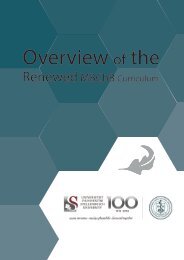ebook
You also want an ePaper? Increase the reach of your titles
YUMPU automatically turns print PDFs into web optimized ePapers that Google loves.
CLINICAL CURIOSITY<br />
Year 4 and 5<br />
Doing and using research as healthcare professionals<br />
The Clinical Curiosity module builds on foundational knowledge that is integrated into the teaching and learning activities of the modules<br />
in the first three years, by teaching students critical appraisal skills. Students get to apply these skills in the remaining three modules<br />
in years 4-6. The module also aims to equip students with the knowledge and skills to identify and apply all the components of a research<br />
project, including reviewing the literature, phrasing clear questions, research methodology, and ethical considerations in research<br />
Distributed Apprenticeship Yr 6<br />
Critically appraise diagnostic accuracy studies<br />
in relation to questions arising in clinical<br />
practice, and apply the steps of evidenceinformed<br />
decision-making<br />
Core Clinical Rotations Yr 5<br />
Critically appraise systematic reviews in<br />
relation to questions arising in clinical practice,<br />
and apply the steps of evidence-informed<br />
decision-making<br />
After reviewing foundation phase<br />
content on accessing and assessing<br />
different kinds of evidence, the focus of<br />
this week is on teaching students the approach<br />
for critical appraisal and applying<br />
this to RCTs. Students will also learn how<br />
to identify research questions and write<br />
a literature review. Students will begin to<br />
work on their protocols in groups.<br />
Students will learn how to apply the<br />
critical appraisal approach to systematic<br />
reviews. The focus of this week will<br />
be on understanding and applying<br />
quantitative and qualitative methodologies.<br />
Students will select an appropriate<br />
research design for their research<br />
question and write the methods<br />
section of their protocols.<br />
Core Clinical Rotations Yr 4<br />
Critically appraise randomised controlled<br />
trials in relation to questions arising in clinical<br />
practice, and apply the steps of evidenceinformed<br />
decision-making<br />
Clinical Curiosity Yrs 4 & 5<br />
During this week, students will continue to<br />
develop their research protocols. They will<br />
learn about managing the data collection<br />
process and key ethical considerations in<br />
research. Students will be taught about<br />
quantitative and qualitative data analysis<br />
and will have the opportunity to apply this<br />
knowledge in practical sessions.<br />
WEEK 1 WEEK 2<br />
WEEK 3 WEEK 4<br />
Students learn how to apply the critical<br />
appraisal approach to diagnostic studies.<br />
The focus of the week will be on interpreting<br />
and writing up results, with practical<br />
academic writing skills sessions and<br />
opportunities to finalise their research<br />
protocols. An overview of the next steps<br />
in the research process will be followed<br />
by sessions on the translation of<br />
research into policy and practice.<br />
Learn how to use and do<br />
health-related research<br />
Interventions Yr 3, Sem 2<br />
Understand randomised controlled trial (RCT) and systematic review study designs<br />
Medical Detective Yr 3, Sem 1<br />
Learn about principles and study designs relating to screening. Understand diagnostic study designs<br />
Dysfunction Yr 2, Sem 2<br />
Understand qualitative study designs. Describe how quantitative and qualitative studies complement one another<br />
Health and Wellness Yr 2, Sem 1<br />
Learn about risk factors and burden of disease. Understand cohort, case-control, and cross-sectional studies<br />
Form and Function Yr 1, Sem 2<br />
Learn how to search for and identify different kinds of evidence sources. Apply descriptive statistics<br />
Being and Becoming in Healthcare Yr 1, Sem 1<br />
Learn principles and steps of evidence-informed decision-making. Identify different kinds of questions and data<br />
CONTACT:<br />
debbiem@sun.ac.za<br />
021 938 9181<br />
OUR MODULE TEAM<br />
Prof Taryn Young Dr Debbie Marais Ms Anel Schoonees Dr Wentzel Dowling Prof Lana van Niekerk Prof Andre van der Prof Dana Niehaus Prof David Hall Mr Rudolf Boshoff<br />
Merwe<br />
& Q Tygerberg<br />
Undergraduate<br />
Research Society




